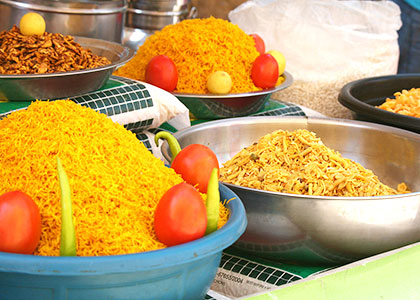7 Reasons You Must Try Indian Cuisine
Indian food – is it all about greasy, spicy, fatty stuffs? Not really. Because Indian cuisine is an art, an experience by itself and a must try when you are visiting the country. Talk about some exceptionally delectable, finger-licking delicacies cooked in traditional ways, and served in unique methods, and Indian cuisine would top undoubtedly. Thanks to the addition of freshly grown spices and herbs to add to several types of vegetables and fruits, the end result stands out in every possible ways.
Here are 7 reasons why trying Indian cuisine.
1. Indian food is healthy
Cooked in traditional methods, with the addition of freshly field-grown vegetables and fruits, Indian dishes retain the freshness and nutrients of the ingredients. Unlike other cuisines that often involve lots of cooking processes resulting in the nutrients to lose their health benefits, Indian food allows you to enjoy their originality both in health as well as in taste to say the least.

|
a) Rajma Chawal – kidney beans cooked in limited spices and served with steamed rice
Health quotient: One serving of 114gms cup consists of approximately 120 calories and 5gms proteins.
b) Sambar Dal - thick stew made with chickpeas, legumes, and several spices exclusive for the dish
Health quotient: 15.0gms protein, 50 calories, 2.6gms carbohydrates, and 1.8gms fat.
c) Buttermilk – Fermented dairy drink
Health quotient: 100 calories and 2gms fat per cup
d) Arhar dal – A type of lentil soup cooked in less spice and seasonal vegetables (sometimes)
Health quotient: 53 calories, 1.2gms fat, 8.0gms carbs, and 2.8gms protein
e) Tandoori chicken – Marinated in yogurt, seasoned in tandoori masala and roasted in various spices
Health quotient: 260 calories, 13.0gms fat, 5.0gms carbohydrates and 30.5gms protein.
2. Indian food is full of spices
And if you thought it is all about rich food in terms of spicy and hot curries, think again. With the use of Indian spices like turmeric, ginger, garlic, cumin, coriander, and mustard – to name a few – the food is full of medicinal and healing properties. Not only do these spices perk up the taste of the food, but the right mix and match of them has healthy benefits for the body too.
Few Indian spices that are healthy and beneficial:
a) CardamonHealth benefits: Has antioxidant properties, and produces compounds that help fight cancer cells.
Often used in: Masala tea, and a variety of sweetsb) Turmeric
Health benefits: Antiseptic properties, anti-inflammatory, medicinal herb for ailments like arthritis, as well as stomach, skin, liver and gall bladder problems.
Often used in: Milk (Haldi Dudh), Indian curries (almost all)c) Ginger
Health benefits: Treats nausea, pain, inflammation, as well as cold and cough, helps in digestion
Often used in: An essential part of Indian cuisine used in several curries; taken in with tea too.d) Cumin
Health benefits: Antioxidant, anti-microbial, and anti-inflammatory properties, helps in weight loss.
Often used in: Murukku (South Indian snack), Indian curriese) Coriander
Health benefits: Has anti-microbial and anti-fungal properties; helps to lower blood pressure, blood sugar level and cholesterol level.
Often used in: Aloo tikki, samosa and other snacks and curries.3. Indian cuisine uses yogurt
Yogurt is a common ingredient used in Indian dishes. The food made from fermented milk help in keeping the digestive tract healthy, mainly because of the good bacteria that it contains. It is also loaded with calcium, which helps to control excess body fat, and also to prevent developing insulin resistance.
Few common dishes that use yogurt or curd as main ingredient:
a) Kadhi Chawal – North Indian dish made of gram flour, curd and spices and consumed as main course with rice.
b) Dahi Vada – Dumplings of lentil and spices soaked in curd and dipped in tamarind chutney served as popular North Indian snack.
c) Lassi – Refreshing drink made of curd flavoured with cardamom powder, saffron, and other flavours.
d) Thayir Sadam – South Indian variety of rice served as main meal where rice is tossed in rich amount of curd and topped with fruits, pickles and other condiments.
e) Curd Rasam – Sour curd is used to make this South Indian dish to give it a distinguishable sour taste.4. Indian cuisine is an emotion
Cooked in thousands of signature style home-cooked procedures, with several stories and mythologies associated with it, many Indian dishes are associated with emotional appeal.
5. Indian cuisine is cooked traditionally
Yes, of course. There are several dishes that follow the traditional method of cooking and no urbanization has been able to touch them yet. These dishes have been able to treasure their unique properties, taste, and benefits. Traditional Indian food uses fresh ingredients and the procedures begin right from the scratches, which includes less preservatives and hence much healthier food on plates. Reasons enough why one must taste the dishes at least once in their lifetime!
Few traditionally cooked Indian dishes:
a) Palak Paneer – Cottage cheese cooked in spinach paste
b) Kaali daal – Black lentils soaked overnight and cooked in clarified butter with a pinch of asafoetida
c) Chhole – Chickpea curry is a favourite side dish in North India, served with rice or Indian breads.
d) Malai Kofta – Vegetable meatballs cooked in block cheese and multiple spices.
e) Butter Chicken – Chicken cooked with kasuri methi, yogurt, and whole lot of spices and condiments.
6. Indian cuisine displays utmost level of hospitality
Which stands out as a totally unique appeal, is the hospitality with which Indian dishes are cooked and served. Guests are considered divine, and to prepare food for them is something that displays a different level of warmth and generosity. The best part of this is reflected in the several varieties of sweets and refreshments which are nothing less than pure bliss.
7. Indian cuisine is always festive
Indians don’t typically need any festivity or celebration to treat on their dishes. Everyday can be a celebration as long as the food is prepared with utmost care, tradition, and age-old practices. You too can be a part of this every day celebration, especially during festivals and pujas. Join in for a full-course dinner at an Indian household to treasure the actual flavour and right essence of the Indian cuisine as a whole.
What are you waiting for? Treat your taste-buds with some of the most exotic Indian cuisines.

